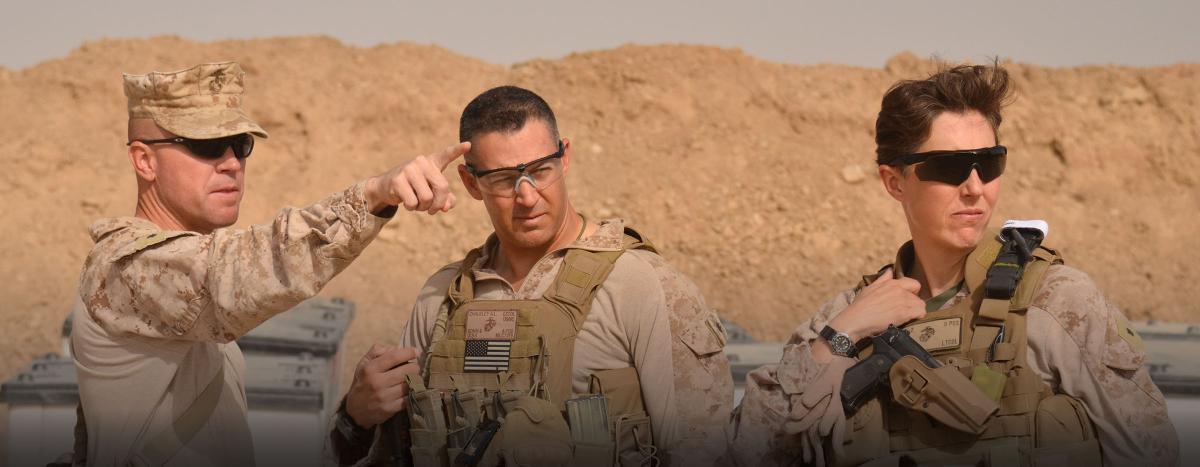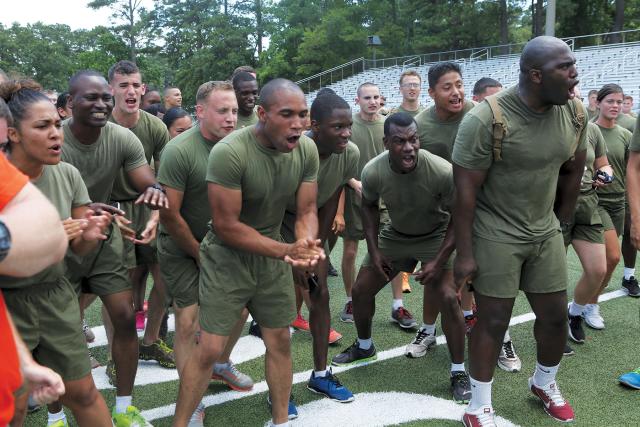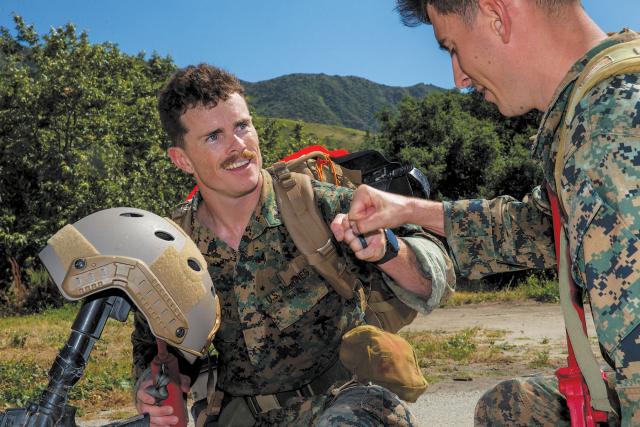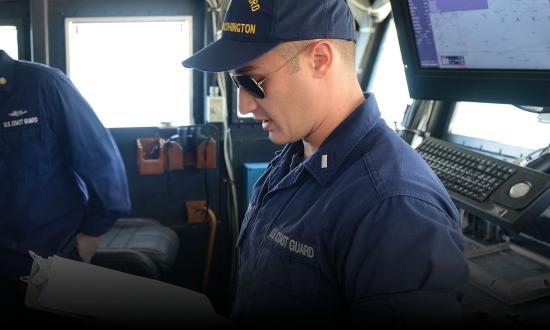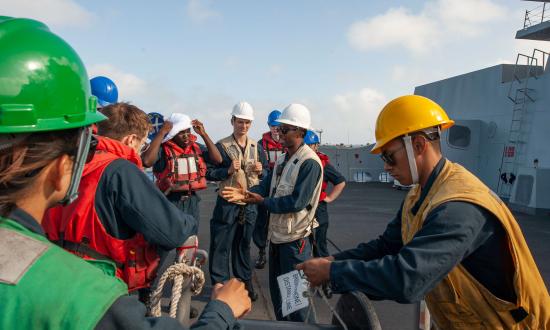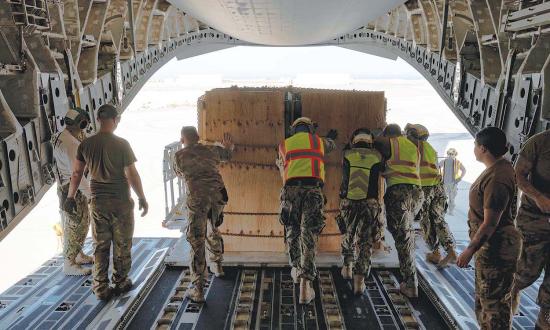Esprit de corps does not appear out of thin air. That sense of identity that breeds cohesion among team members is a force multiplier that must be built. When developed, it brings strength, energy, and vigor to any team. Esprit de corps defines a special club, a brotherhood, a sisterhood, an organization, an institution that is greater than its individual members. Such groups often trace their lineage to long before any of the current members joined. Esprit de corps is often strengthened by an inherited legacy kept alive by reverence for those who went before.
Esprit de corps develops over time through shared hardship and accomplishment, by collective blood, sweat, and tears. This invisible force can soar to great heights and push its hosts to achieve awesome triumphs. When the chips are down, it can lift the members of its trust from the depths of despair and snatch victory from the jaws of defeat. History has documented countless cases of this happening. Though it may be hard to measure, it is indisputable that units with strong esprit are more combat efficient than units without. Anyone who has experienced it can attest to its effectiveness.
I saw its effect firsthand years ago, when I checked into my first unit as an 18-year-old private first class (PFC). I remember it clearly. The general attitude from the command deck down to the senior lance corporals was, “Welcome to the best damn battalion in the Marine Corps.” Less than a year before, they had returned from the invasion of Iraq, where they charged all the way to Baghdad without a single Marine killed in action. They thought they were invincible. On the next deployment, that unit (including me) fought in one of the toughest battles in recent Marine Corps history—the Battle of Fallujah—and suffered a great many Marines killed and wounded. When we came back from that deployment, we told our new joins, “Welcome to the best damn battalion in the Marine Corps,” with even more vigor than the year before. When you are an 18-year-old PFC arriving to your first unit, or a 19-year-old lance corporal returning from your first deployment, you do not know what makes a battalion good or bad, much less the best unit in the Marine Corps. Yet, I believed it then, and I believe it now. We were the best damn battalion in the Marine Corps, and there was nothing we could not conquer. Our esprit de corps was unbreakable.
Contrast this experience with when I joined my next unit years later as a second lieutenant. It had recently returned from Afghanistan and also had not lost a single Marine killed in action, but the mood of the unit was quite different. The common sentiment I heard from the Marines was, “Welcome to the worst damn battalion in the Marine Corps.” By this time, I had been on a few deployments and met many Marines and leaders of Marines, and I knew then what I know now: This was not the worst battalion in the Marine Corps. Not a chance, not by a long shot. Many of the Marines, however, had heard this lie enough times that they believed it. I was shocked. I had never seen a group of such sad, dejected, and demoralized Marines. They looked the part as well—bad haircuts, lousy uniforms, very little pride in being Marines, and some very bad attitudes. Many seemed as if they were under a gray cloud and hung their heads.
When we began the work-up for our next deployment and tested our skills in garrison and in the field, it became clear, as I suspected, that this was not the worst battalion in the Marine Corps. Yet, at times and in certain ways, we acted like it, because the Marines had such low self-esteem and so little pride in themselves. This attitude, whether in individuals or in a group, is toxic. Even worse, it is contagious. Marines and units afflicted with this cancer sink into a downward spiral from which it can be hard to recover. When troops believe they are garbage, the sentiment becomes a self-fulfilling prophecy, as their performance will attest. When a unit is in such dire straits, something must be done.
Coincidentally, our battalion commander had served in our battalion years before when he was a lieutenant. He gathered the officers and told us about the proficiency, professionalism, and esprit de corps of the battalion during his service. He said it was the most combat-ready unit he had ever served in, and though they did not go to combat during that deployment, they trained Marines who went to combat on later deployments and did great things. He said we were going to get back to that.
The battalion headquarters of my first unit was like a museum, full of artifacts, mementos, and images of Marines from that unit in famous battles throughout its history. Citations and portraits of Marines who received high awards for valor were among the first things visitors saw. Any member of the unit who walked those halls could not help but feel a sense of pride at belonging to something greater than themselves, a member of a unique society of warriors and stewards of its organizational culture. Members felt a connection with those in the battalion who had served with distinction in war and peace, in any clime and place. The connection filled its members with a zeal for their fellow Marines, both past and present, that inspired them to continue moving forward long after most people would have given up. It was an honor to be a member of such a fraternity.
The battalion headquarters of my second unit did not possess this air. Despite a proud and storied history full of exploits, the walls in the battalion command post were bare. The unit had recently relocated to a new building and much of its memorabilia had been lost or put in storage somewhere and forgotten. The battalion commander set about correcting this travesty. He assigned junior officers to write descriptive paragraphs about significant actions the battalion had been in and had posters made that featured the text set against heroic photographs of Marines in the event. He wanted his Marines to be aware of their unit’s history and to understand they were in great company with their forebears.
To this end, he held multiple professional military educational events. In one such event, a former battalion lieutenant gave the Marines a presentation about the battalion’s participation in an early, little-know Iraq War battle. The commander also filled the base theater and put on episodes of the HBO miniseries The Pacific, to share with the Marines the legacy they had inherited.
Our battalion commander’s efforts to instill esprit de corps did not rely only on memories of the past. He put significant effort into recognizing the contributions of the current crop of Marines. He arranged for combat camera Marines to accompany the battalion on field exercises and had these images hung around the battalion area. In addition, he dedicated three conference rooms in the battalion headquarters building—one for the noncommissioned officers to study and teach their Marines, and the other two to battles and areas of operations in which the battalion had operated in while in Iraq and Afghanistan. He wanted to commemorate the recent generation of warriors in our unit, some of whom were still in the battalion’s ranks.
To further a healthy spirit of competition, friendly rivalry, and build esprit de corps within the companies, he mandated a series of field meets in which the troops could cheer on their fellow Marines as they competed in sporting events and martial-themed challenges. To the winner went a well-earned long weekend. He challenged the companies to vie for the highest collective physical and combat fitness test scores and the highest collective Marine Corps Martial Arts Program qualifications. In our battalion, there were always competitions designed to make Marines pull together and stay sharp.
Our battalion commander also wanted to compete against other units. He asked each company to contribute their highest-scoring shooters on the rifle range to compete in the Division Rifle Matches, where our Marines made a good showing. Most significantly, he challenged the battalion to win the Division’s Annual Super Squad Competition. He charged each company to assemble a squad of its best Marines to compete for the honor of top squad in the battalion. That squad went on to win the coveted Division Super Squad badge and meet the Commandant of the Marine Corps.
These are only a few of the things he directed to facilitate a healthy climate and foster the esprit de corps that makes Marine Corps units punch above their weight in combat. During our work-up and deployment overseas, we conducted tough, realistic, and, most importantly, meaningful training that tested the mettle of our Marines and forced them to work together and tap their physical and moral strength. From hiking up mountains, rappelling down cliffs, patrolling steaming jungles, and training with foreign militaries in tropical climates and freezing temperatures, to running out of the backs of helicopters and amphibious assault vehicles, we trained for combat. We never went into combat, but as the battalion had done years before, when the commander was a member of it, we trained Marines who would go into combat later, and we trained them well. By the end of his time as battalion commander, we were a combat-ready battalion. I would have been proud to go into action as a member of that unit, and I was not the only one. Ours was a proud unit once again.
Our battalion commander made the difference to the troops and taught me an important lesson: It is the responsibility of all leaders to build and cultivate esprit de corps in their units; if the unit already has a sense of esprit de corps, then it is the duty of the leader to protect and maintain it. Marines come and go, but like battle streamers, the magic belongs to the unit. Leaders must keep the spirit alive and strong for their subordinates and for those who follow, because some day, that strong esprit de corps will be needed to propel them to triumph. It may be the last thing left between life and death, victory and defeat.



